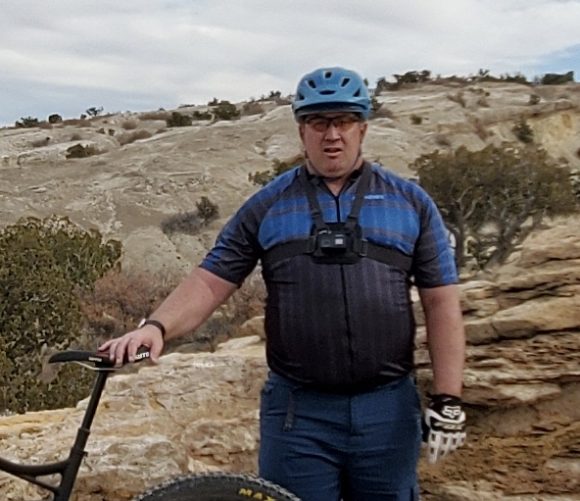Today’s guest on the podcast is Taber West, founder of Gravity Worx, the manufacturer of a high performance suspension electric bike, called the E160FS.
Scroll down to listen to the podcast
When Taber was younger he raced bikes professionally, but as he aged and gained weight he no longer could do the type of cycling he used to enjoy, particularly mountain biking. When he discovered that a high performance e-bike could empower him to ride places he had thought were impossible, he set out to build his own.
Main Points
(3:50) Taber gives his background. He started out as a junior electrical engineer in the Navy. He has worked at various tech companies such as Unisys and Intel. He worked at Los Alamos National Laboratory (in his home town), where he worked on projects such as constructing super computers, running fiber networks, and various classified projects for United States military and security agencies. This gave him a wide background in fields such as advanced manufacturing, digital systems, and programming. He has three engineering degrees in electrical engineering, complex systems, and software engineering.
(5:22) Taber says when he was younger he raced bicycles professionally in triathlons and mountain biking, which he calls “painful and financially ungainful.” He says he liked mountain biking the best, even though mountain bikes back then were primitive and braze welded, with no suspension. He says he has tested just about every mountain bike component over the last 30 years.
(6:30) Taber talks about restarting his old bicycle company, Gravity Worx, 6 years ago, focusing on building state of the art carbon fiber mountain bike wheels. He designed a multiple wheel mold and started producing composite wheels and testing them under extreme riding conditions. He wanted to create a mountain bike built to withstand hitting the trails hard or carrying a heavy rider such as himself—Taber says he is 6 feet and weighs 300 pounds.
(9:25) Taber says he knew that with the right technology he could build a mountain bike stronger, faster, and better than anything else out there. The problem was that the best technologies which were being used in aerospace and ballistics had not yet been applied to building bicycles.
(10:00) Taber shows Noah a cut section of one of his rims, a hollow composite layup in a three piece mold that has no holes in the spokes.
(12:00) Taber says that after he engineered his components he had to search for the right machine tool to produce them.
(12:50) Taber explains in detail the components for his bikes’ hub shells. The body of the hub shell is forged from a 7075 ingot of aluminum alloy, then heat treated, then machined down.
(16:40) Taber talks about the production process for the hub. He says to make the hub at a typical machine shop it would probably require 2 different 5-axis mills and 4 different operations. He discovered that Samsung has multi-axis Swiss-type mills designed for feeding in bar stock that can machine the part in about 9 and a half minutes. He said another option is the INDEX C300 turning center priced around $1million (he estimates), which can make the part in about 4 and a half minutes.
(22:30) Taber talks about his prototype rear derailleur, the mechanism that shifts the chain at the rear sprockets (see video). He says his is different from all other rear derailleurs in the world because it’s designed specifically for his mountain bikes and e-bikes. He says an e-bike bike is extra heavy and has to withstand significantly more torc.
(23:25) Taber talks about how he has to produce very precise bike components because even a few extra grams can effect performance.
(24:25) Taber compares his e-bike’s features with competitors. He says he can get 55 hours of heavy climbing out of a single battery charge. He says part of the reason he can get such long battery life is that his bike weighs 44 and half pounds while a typical e-bike is in the 53-55 pound range. Thus, his bike is lighter, but is built to hold more weight. He says he designs his bikes to climb a hill at a 20% grade over rock. Taber says that his initial prototype bikes have passed 500 miles of riding and 63,000 feet of climbing.
Question: What is your experience with e-bikes?
Podcast: Play in new window | Download


2 Comments
I’m an avid cyclist–road, mountain, cyclocross… No experience with ebikes yet but I’m getting ready to convert a full suspension mountain bike to electric.
Thanks for commenting John! They are fun. From my limited experience!